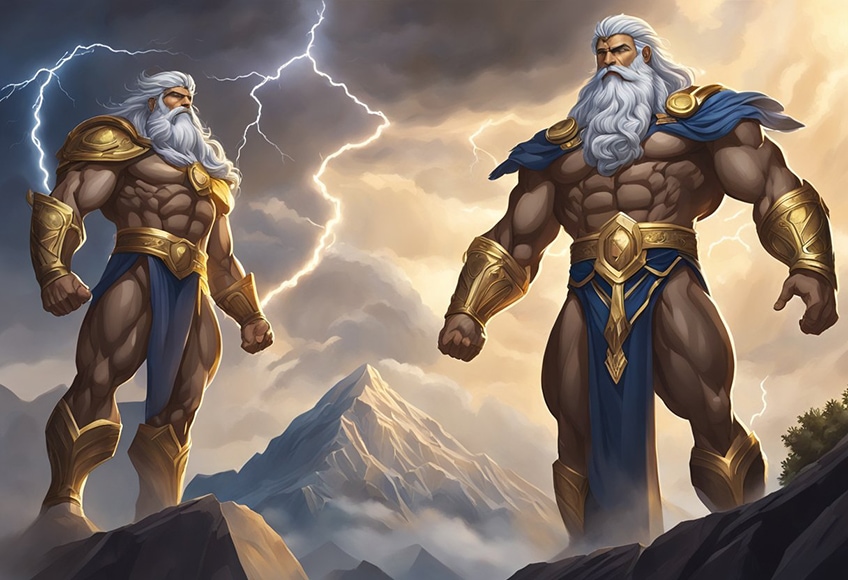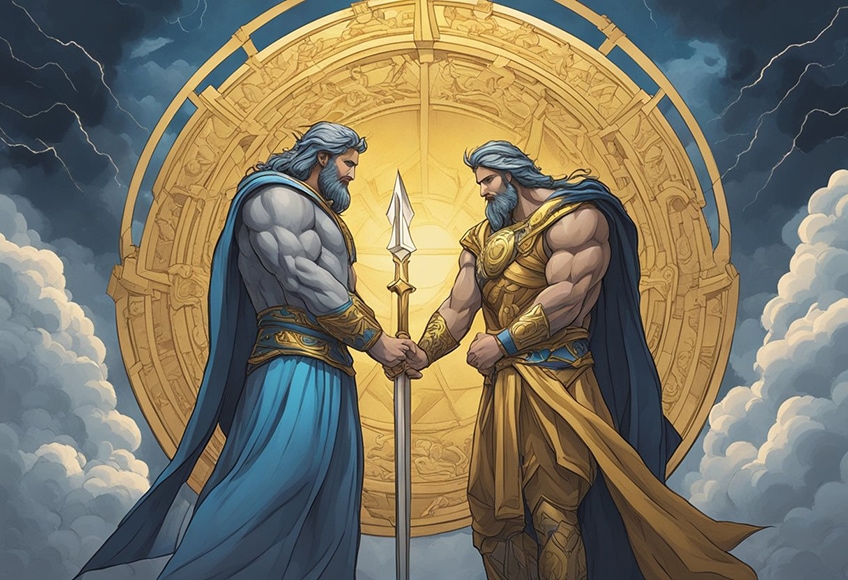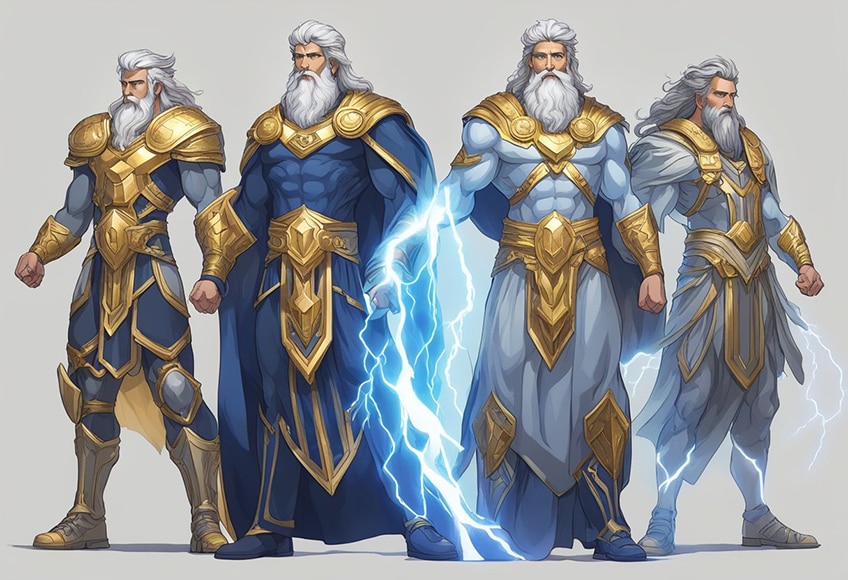Siblings of Zeus – The Mighty Figures of Greek Mythology
In Greek mythology, the pantheon of gods is both vast and complex, with Zeus holding the position as the king of the gods and the ruler of Mount Olympus. His narrative is intertwined with those of his siblings, who not only share a common lineage but also play pivotal roles within the mythological realm. The siblings of Zeus encompass prominent Olympian gods and goddesses, each ruling their respective domains and collectively shaping the very foundations of Greek mythos.
Key Takeaways
- Zeus, as the preeminent figure in Greek mythology, has his destiny entwined with that of his siblings.
- The shared lineage from the Titans Cronus and Rhea forms the bedrock of these Olympian gods’ powers and roles.
- The division of power amongst Zeus and his siblings underpins the governance of the different aspects of the natural world and humanity.
| Name | Domain | Parents | Symbols | Consorts | Children |
|---|---|---|---|---|---|
| Hestia | Goddess of the hearth, home, and chastity | Cronus and Rhea | Hearth, fire, kettle | None | None |
| Hera | Goddess of marriage, women, childbirth, and family | Cronus and Rhea | Peacock, cow, crown, pomegranate | Zeus | Ares, Hebe, Eileithyia (with Zeus) |
| Demeter | Goddess of the harvest, fertility, agriculture, nature, and the seasons | Cronus and Rhea | Cornucopia, wheat, torch, bread | Iasion (some myths) | Persephone (with Zeus), others vary by myth |
| Hades | God of the dead and the king of the underworld | Cronus and Rhea | Bident, helmet, Cerberus, cypress | Persephone | Melinoë, Zagreus (with Persephone), others vary by myth |
| Poseidon | God of the sea, earthquakes, storms, and horses | Cronus and Rhea | Trident, fish, dolphin, horse, bull | Amphitrite | Triton, Rhode, Benthesikyme (with Amphitrite), others vary by myth |
The Titan Heritage

The lineage of Zeus is anchored in the legacy of the Titans, where intricate family dynamics lead to the birth of the Olympian gods and a consequential clash known as the Titanomachy.
Cronus and Rhea
Cronus and Rhea, themselves offspring of Gaia (Earth) and Uranus (Sky), are pivotal figures in Zeus’s lineage. They represent the last generation of Titans who held cosmic power before the rise of the Olympians. Cronus, having overthrown his own father, secured his throne with a ruthless decree to swallow any of his offspring, as a prophecy foretold his downfall at the hands of his children. Rhea, distressed by the fate of her offspring, orchestrated a plan to save her youngest child.
The Birth of Zeus
In the secluded caves of Crete, Rhea gave birth to Zeus, her youngest titan child. To protect him from Cronus’s devouring nature, she presented Cronus with a stone wrapped in swaddling clothes, which he swallowed, believing it to be his son. This deception allowed Zeus to be raised in secret, far from the threat of his father’s cannibalistic tendencies.
Titanomachy
The Titanomachy was the legendary ten-year war between the old gods, or Titans, and the new deities, the Olympian gods. Once Zeus came of age and learned about his heritage, he led his siblings and allies in a fierce rebellion against Cronus and the ruling Titans. This cosmic battle ended with Zeus’s victory, fulfilling the prophecy where Cronus was dethroned. The Titans were subsequently imprisoned in Tartarus, marking the end of their dominion and the rise of Zeus and his siblings to the throne of the Olympian gods.
Zeus’s Siblings and the Division of Power

Zeus, the ruler of Olympus, shared his dominion with his siblings, each governing a significant aspect of the ancient Greek cosmos. Their roles not only defined their identities but also the natural and societal orders.
Hera: Divine Matron of the Olympian Pantheon
Hera, beyond her role as sister and consort to Zeus, occupied a paramount position as the queen of the Olympian deities. Embodied as the quintessence of marriage and the guardian of matrimonial sanctity, Hera’s essence intertwined deeply with the concepts of fidelity, partnership, and familial bonds.
Her veneration across the Hellenic world underscored her as the protector of marital unions and the advocate of wives, marking her influence in both the divine and mortal realms. Hera’s narratives often depict her as a figure of immense dignity and power, navigating the complexities of her marriage with Zeus and asserting her authority amongst gods and mortals alike, symbolizing the multifaceted role of women in ancient Greek society.
Poseidon: Sovereign of the Marine Domain
Poseidon, Zeus’s brother, wielded dominion over the vast and tempestuous realm of the sea. With his iconic trident, an emblem of his sovereignty, Poseidon commanded the waters, orchestrating life-giving rains and catastrophic tempests alike.
His authority was unchallenged in the marine depths, extending over all creatures within his domain and those humans daring to traverse his waters. Poseidon’s temperament, as unpredictable as the sea itself, played a crucial role in the narratives of ancient Greek mythology, embodying the dual nature of the ocean as both a source of sustenance and a perilous force.
Demeter: Patroness of Grain and Growth
Demeter, sister to Zeus, held the venerable office of the goddess of agriculture and the harvest. Her divine favor was pivotal for ensuring abundant harvests and the fertility of the earth, making her worship central to Greek life and survival.
The Eleusinian Mysteries, sacred rites dedicated to Demeter and her daughter Persephone, highlight her significance in ancient Greek religion, promising initiates greater mysteries and understandings. Demeter’s lore encapsulates the intrinsic link between the divine and the cycle of seasons, embodying the perpetual renewal of life and the profound relationship between deity and devotee.
Hades: Custodian of the Afterlife
Hades, the eldest sibling of Zeus, presided over the Underworld, a realm distinct from the abodes of the living yet crucial to the cosmic balance. As the steward of the afterlife, Hades oversaw the passage of souls and maintained the equilibrium between mortality and eternity.
His kingdom, abundant in precious metals and gems, symbolized the wealth beneath the earth’s surface as well as the inevitable destination of all mortals. Despite his ominous domain, Hades was a just ruler, impartial and fair in his governance, ensuring the dead were accorded their rightful place in the afterlife. His relationship with Persephone underscores themes of cyclicality and rebirth, essential to the natural and divine order.
Hestia: Hearthkeeper and Symbol of Domestic Harmony
Hestia, the eldest of Zeus’s siblings, was the guardian of the hearth and home, embodying the sanctity of the domestic sphere. As the goddess of the hearth, her presence was felt in the heart of every home and temple, her eternal flame symbolizing the continuity of family and community.
Hestia’s role was foundational to social and religious life in ancient Greece, offering a divine model for hospitality, stability, and familial unity. Her choice to cede her position amongst the Olympians to Dionysus reflects her embodiment of humility and service, emphasizing the importance of the collective over individual acclaim in maintaining the social fabric.

